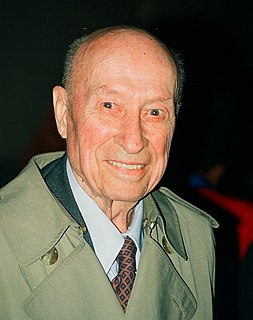A Quote by Albert Einstein
Conscious man, to be sure, has at all times been keenly aware that life is an adventure, that life must, forever, be wrested from death.
Related Quotes
I believe that the unity of man as opposed to other living things derives from the fact that man is the conscious life of himself. Man is conscious of himself, of his future, which is
death, of his smallness, of his impotence; he is aware of others as others; man is in nature, subject to its laws even if he transcends it with his thought.
Everybody is afraid of death for the simple reason that we have not tasted of life yet. The man who knows what life is, is never afraid of death; he welcomes death. Whenever death comes he hugs death, he embraces death, he welcomes death, he receives death as a guest. To the man who has not known what life is, death is an enemy; and to the man who knows what life is, death is the ultimate crescendo of life.
I've always been keenly aware of the passing of time. I've always thought that I was old. Even when I was twelve, I thought it was awful to be thirty. I felt that something was lost. At the same time, I was aware of what I could gain, and certain periods of my life have taught me a great deal. But, in spite of everything, I've always been haunted by the passing of time and by the fact that death keeps closing in on us.
The conquest of the fear of death is the recovery of life's joy. One can experience an unconditional affirmation of life only when one has accepted death, not as contrary to life, but as an aspect of life. Life in its becoming is always shedding death, and on the point of death. The conquest of fear yields the courage of life. That is the cardinal initiation of every heroic adventure - fearlessness and achievement.
My benefactor said that when a man embarks on the paths of sorcery he becomes aware, in a gradual manner, that ordinary life has been forever left behind; that knowledge is indeed a frightening affair; that the means of the ordinary world are no longer a buffer for him; and that he must adopt a new way of life if he is going to survive. The first thing he ought to do, at that point, is to want to become a warrior.
What makes people want to live forever? I don't think it's limited to our materialistic society of today. Even back to Christian times, they were writing about eternal life after death. So even in death there was a discussion of eternal life. I think this is a universal human desire. It's a horrible thought that this conscious being of ours - with our beautiful bodies - is one day going to decay and die. I don't think it so much has to do with the fear of meeting God, as it is just the thought that this all ends.
We are left with nothing but death, the irreducible fact of our own mortality. Death after a long illness we can accept with resignation. Even accidental death we can ascribe to fate. But for a man to die of no apparent cause, for a man to die simply because he is a man, brings us so close to the invisible boundary between life and death that we no longer know which side we are on. Life becomes death, and it is as if this death has owned this life all along. Death without warning. Which is to say: life stops. And it can stop at any moment.
What if it is for life's sake that we must die? In truth we are not individuals; and it is because we think ourselves such that death seems unforgivable. We are temporary organs of the race, cells in the body of life; we die and drop away that life may remain young and strong. If we were to live forever, growth would be stifled, and youth would find no room on earth. Death, like style, is the removal of rubbish, the circumcision of the superfluous. In the midst of death life renews itself immortally.
By 'coming to terms with life' I mean: the reality of death has become a definite part of my life; my life has, so to speak, been extended by death, by my looking death in the eye and accepting it, by accepting destruction as part of life and no longer wasting my energies on fear of death or the refusal to acknowledge its inevitability. It sounds paradoxical: by excluding death from our life we cannot live a full life, and by admitting death into our life we enlarge and enrich it.
Death is the end of the fear of death. [...] To avoid it we must not stop fearing it and so life is fear. Death is time because time allows us to move toward death which we fear at all times when alive. We move around and that is fear. Movement through space requires time. Without death there is no movement through space and no life and no fear. To be aware of death is to be alive is to fear is to move around in space and time toward death.
God knows we have our own demons to be cast out, our own uncleanness to be cleansed. Neurotic anxiety happens to be my own particular demon, a floating sense of doom that has ruined many of what could have been, should have been, the happiest days of my life, and more than a few times in my life I have been raised from such ruins, which is another way of saying that more than a few times in my life I have been raised from death - death of the spirit anyway, death of the heart - by the healing power that Jesus calls us both to heal with and to be healed by.




































